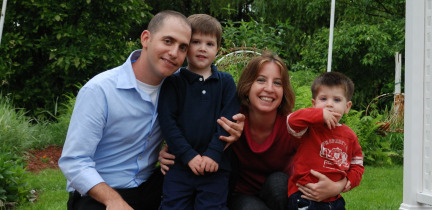Israeli biologist Tommy Kaplan only got interested in biology at the age of 25. Seven years later, he has won a prestigious US prize for his work.

Dr. Tommy Kaplan’s interest in biology only started as a graduate student at Israel’s Hebrew University of Jerusalem (HU). As a computer science student, aged 25, he went to work as a programmer at his wife’s biology lab. Today the 32-year-old scientist has won a prestigious award from General Electric and Science magazine for his work in biology.
Kaplan, a Ph.D. graduate from HU, who is now based at the University of California at Berkeley doing post-doctoral research, is one of three other young scientists to win the GE & Science Prize for Young Life Scientists. The other winners are from the US, Germany, and Japan.
Born and raised in Jerusalem, Kaplan won the $5,000 prestigious prize and publication in Science, for his essay “From DNA Sequence to Chromatin Dynamics: Computational Analysis of Transcriptional Regulation.”
“Basically we have the same DNA in all our cells,” he tells ISRAEL21c. “But the cells in the body are very different from each other. This is the outcome of a complex system of switches which determines which proteins will be expressed in which tissues, under which conditions.”
In his essay, Kaplan explores the topic of knowing which genes and proteins will be expressed under what conditions and in which tissues, using computational biology, something he is an expert in. “Basically the papers for which I got this prize dealt with the way DNA is packed in the nuclei. We saw there is a kind of a code that tells you what is written in the DNA and this code is on the outside of the DNA, on the packing,” Kaplan says.
Bridging a gap in understanding
“Just by looking at the way the DNA is packed you can tell where the genes are and whether they are active or not,” he explains. Essentially, this line of thinking offers additional information about the DNA sequence, important for having more information about diseases such as a cancer and all others that involve problems in complex biological process called “transcriptional regulation.”
“It’s very important,” he says. “There is a huge gap in understanding in this field. We have the genome sequences for humans and we have more tools to understand personalized medicine but we don’t know how to read [all the genetic information]. Our research is basic. It is to understand what goes wrong in diseases – something we need to understand in order to come up with therapeutic solutions.”
Kaplan’s work has been published in Science and Nature Genetics, and out of principle, he has published recent papers in the PLoS journals, high quality “open source” science journals that allow researchers to retain copyrights’ and universities and researchers to access the papers free of charge. While the name PLoS doesn’t sound as prestigious as Nature or Science, for Kaplan it was an ethical decision.
His Berkeley supervisor, Prof. Mike Eisen was one of the founders of the journal and after learning more, Kaplan understood that it is built on sound moral principles. In effect, it does away with the Ivory Tower concept, that academic information should be accessible to the rich and privileged universities and students.
A decision to be a dad
And just as important as being a good scientist and sticking to a moral code in his work, is being a dad. Kaplan and his wife, a medical doctor and researcher, have two young boys. This sets them apart in Berkeley in a place that encourages scientists to only start parenting after tenure is achieved, Kaplan says.
“We are living with my parents right now in Jerusalem in one room while we’re visiting Israel for a month over the winter break. It’s fun and demanding.
“It’s important for me to me to say that in science you can combine family and career. In ours, both work. My wife has had two careers, and me just one. I was 28 in my second year of graduate studies when my son was born.
“Most faculty in the US wait until their 40s, and a position, until starting a family. For me it was important not to neglect this part of my life. In my lab in the US, I am the only one with kids, besides my supervisor who is older than me. You can manage to do both but it will take you longer,” he adds.
Meanwhile, Kaplan’s dream is to open a research lab in Israel after his post-doc at Berkeley. He plans on adding the GE/Science prize to his CV to open tightly guarded doors in the very competitive world of academia in Israel.












